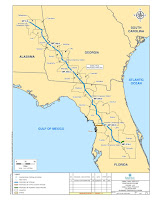Groups Demand FERC Examine Climate Effects of Natural Gas Pipeline
Sabal Trail Pipeline Would Transport Billions of Cubic Feet Everyday to New Power Plants in Florida

WASHINGTON, D.C. — Today, the Sierra Club, Flint Riverkeeper and Chattahoochee Riverkeeper filed a lawsuit in the U.S. Court of Appeals for the District of Columbia challenging the Federal Energy Regulatory Commission's (FERC) approval of the massive Southeast Market Pipeline project, which involves 685.5 miles of natural gas pipeline for approximately 1.1 billion cubic feet per day of natural gas to markets in Florida and the southeast United States. The groups contend the FERC failed to analyze the climate impacts of the project and the power-plants it would serve and also failed to adequately analyze alternate routes that would have less impacts on the environment and communities of color.
The project, which includes the 515 mile Sabal Trail pipeline, would transport fracked gas across 699 waterbodies, lakes, rivers, and streams and harm 1,958 wetland systems in three states: Alabama, Georgia, and Florida. It would also extend through central Florida and southern Georgia over an area that provides drinking water to approximately 10 million people. Pipeline construction alone poses a threat to local water resources as the process threatens to release hazardous materials and drilling mud into the aquifer, polluting the drinking water, and resulting in rapid transmission of drilling mud over great distances.
The Council on Environmental Quality recently issued guidance to agencies underscoring the importance of evaluating the climate impacts when assessing environmental impacts as required by law. Methane, released when extracting and transmitting gas, is 87 times as potent as carbon dioxide over 20 years. In addition, the power plants to be served by the project would emit greenhouse gases into the environment and foreclose less polluting alternatives such as wind and solar.
"In order to avert the worst impacts of climate change, it's essential that FERC does its job and fully considers climate impacts before approving any new gas pipelines like Sabal Trail," said Eric E. Huber, Sierra Club managing attorney.
"The Sabal Trail pipeline is a serious threat to the rivers, springs and our drinking water found in the Floridan Aquifer," said Sierra Club representative Merrillee Malwitz-Jipson, who lives near the path of the pipeline in Florida. "It also increases Florida's reliance on fracked natural gas and the harmful emissions that come with it's extraction, transportation, and storage, Yet despite being aware of these problems and the strenuous objections by the African-american community in Albany, Georgia and surrounding areas, the pipeline companies have already begun construction."
"FERC used a distorted census tract analysis to evaluate the environmental justice impacts of locating a massive 40-acre polluting compressor station facility in the middle of a black neighborhood, and failed to consider the undeniable climate change impacts of burning 1.1 billion cubic feet of natural gas each day that will be transported by this pipeline project in violation of the National Environmental Policy Act (NEPA)," said Steve Caley, Legal Director for GreenLaw who is representing the petitioners in their challenge to FERC's approval of the Project.